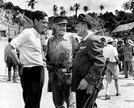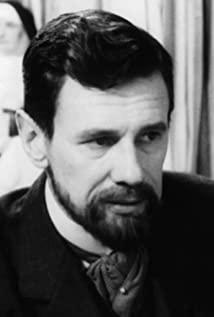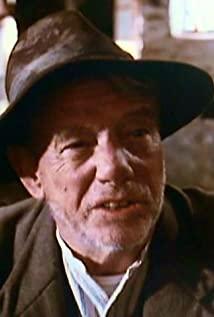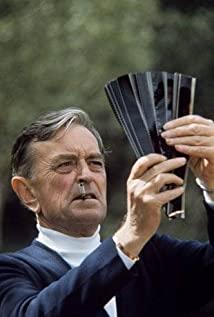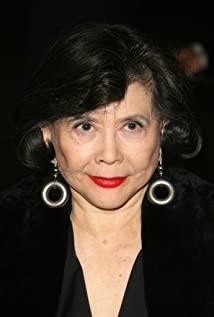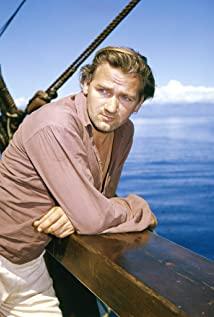The Bridge on the River Kwai is a classic movie. It is another masterpiece by David Lean, which won 7 Oscars that year. It's a different anti-war movie, and it's not as obvious as the others. There is no absolute bad guy or absolute good guy in the film, and it tries to show a difference in national character. Americans are realistic and flexible, but also cunning and rascal, British are rigid, exuding a strong aristocratic temperament all the time, Japanese. Being controlled by the spirit of Bushido makes him stupid and inhuman. The director has been trying to keep the audience from noticing that they are people first and have something in common, and characteristics second. Another detail is that after the last Japanese soldier who escaped is killed, the camera stops for a few seconds on a photo of a Japanese soldier falling down, so that the audience can see the person above. This short few seconds is enough for the audience to think. The dead little Japan is the enemy, but it is only the enemy. He also has a family and his own life. He is a person with feelings. The war has made everything irrelevant. No matter who he is, as long as he is the enemy, that is the goal. The Canadian guy is overwhelmed when he meets the Japanese head-on, which is also one of the contradictions that the movie wants to show. The Canadian guy is kind-hearted. , he is not timid, as can be seen in his second encounter with the Japanese. That time, he killed the Japanese colonel without hesitation, because this time he was from behind instead of front, and the enemy was not a real person who faced him, so he would not have the slightest sympathy.
The beginning of the movie is interesting. The relaxed and entertaining attitude of American prisoners of war made the audience feel the atmosphere of hardship and pleasure in the prisoner of war camp. When the British officers resisted the orders of the Japanese officers with their death, the Geneva Convention, which was knocked to the ground, was evidence of the Japanese defiance of everything. The British's axis won the round for them, and then immediately turned on the horsepower to relieve the urgent needs of the Japanese officers. First, the work progress of the prisoners of war was improved, then new project goals were determined, and the site was re-selected. Finally, the railway was opened within the required construction period. This story shows the stubbornness and arrogance of the British. They always think that they are persistently pursuing life and belief, and life will give them a satisfactory answer. In the end, the British officer found the bridge bombing team led by American prisoners of war. Although the detonator died, the British officer lay on the detonator before dying, and blew up the bridge he was proud of. This bridge is his self-salvation for his life as a prisoner of war. As he said, the bridge was not built to show favor to the Japanese, but to make the group of British soldiers under him not lose their life goals because of wasting time. Only in this way can life be meaningful. British officers say so and do the same. From command and dispatch to relocation, he went all out. No matter whether he or his officers would be sunburnt or not, he would stick to the principles of a soldier. I don't know whether to call such a person firm-willed or stubborn.
In comparison, the American prisoner of war is like a gangster. He doesn't want to fight at all, he doesn't want to be a soldier, and he only wants to pick up girls. But he is very smart, he knows how to get away with it, how to ease his pain. He has no principles, and when a major event is imminent, his own interests are placed above the illusory country. He will first ensure his own safety in action, and then go to implement the plan. He is self-sufficient, and if it wasn't for the purpose of stealing his rank, he would have run away. It is a conflict in character with the British officer type. It is interesting that these two extreme characters in the whole film only meet twice at the beginning and the end, and only one dramatic sentence is arranged. This is actually a place for movie classics. On the surface, the American is slick and sophisticated and lives for himself, but at a critical moment he made the right choice at the cost of his life. The British officers only know to defend the principle to the death, and do not consider the meaning behind the principle. Fortunately, he finally figured it out. This reversal of character shows that war makes people forget human nature, and only makes people remember hatred, for the sake of winning or losing, and what is more important than human life.
Finally, there is the Japanese colonel, he is not an ordinary person, he is a soldier. Although he is a devil, he is still a real soldier. He has both honor and shame. His purpose was to repair the bridge, but he was not the one who built it in the end, and he envied the British's skill while being ashamed of his own incompetence. While the British were building bridges, he gave up on himself and let his prisoners of war point fingers at him in front of him. He felt humiliated and cried when no one was there, so no matter if the bridge was not repaired on time, he would kill himself. Whether he's a bad guy or not, he's a good soldier who obeys orders, abandons himself, and sticks to his sense of honor as a soldier.
This movie is very interesting. These three characters are set up to represent a kind of person, and the microscopic way of personal conflict is used to insinuate all kinds of things in the macroscopic world. As an anti-war film, it is really new, and the scenery of Southeast Asia is also displayed at a glance. The viewing experience of 2 hours and 40 minutes is not bad, and it is difficult to remake it.
View more about The Bridge on the River Kwai reviews





